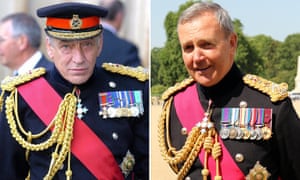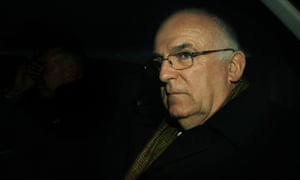Chilcot report expected to single out senior British military figures
The GuardianAmong those facing criticism over Iraq are Gen Sir Nicholas Houghton, chief of defence staff, and Gen Sir Mike Jackson
Senior military figures will be singled out for criticism alongside Tony Blair and other establishment figures in the long-awaited Chilcot report into the 2003 invasion of Iraq, which is due to be handed to Downing Street next week.
At more than 2m words in length, it is a damning critique, with military commanders expected to be reprimanded for allowing themselves to be bulldozed by No 10 in the run-up to the war.
Blair, former ministers, intelligence officers and top officials are also in focus, in a document that is is not expected to be published until after the EU referendum because it needs to be vetted and formatted for publication.
Those expected to be criticised include Gen Sir Nicholas Houghton, then head of military operations – and now chief of defence staff – and the then head of the army, Gen Sir Mike Jackson, according to sources with knowledge of the report. “The question is what proportion of blame is going to be on the politicians, on the military, and on the civil servants,” one of those who gave evidence to the inquiry said.
Ministers in focus will be the former defence secretary Geoff Hoon, former foreign secretary Jack Straw, and former international development secretary Clare Short, as well as Blair.
During a debate in the Commons on Thursday, a string of MPs from both sides called for publication in the first week of May, after the local elections. Some questioned whether the document was being delayed until after the EU referendum on 23 June so as not to distract from the remain campaign.
The Cabinet Office minister John Penrose said that the report was unlikely to be published until June or July. He said that when it arrives in Downing Street, intelligence officers will be given up to a fortnight to vet it to ensure there is nothing that could endanger any life, but not to censor it. More time after that would be needed to prepare it for printing.
A firmer date for publication will be announced by Chilcot after the intelligence services have completed their vetting, Penrose added.
The Conservative MP David Davis, one of those who wants the report published in early May, described a delay as “incomprehensible and unacceptable” and questioned why Sir John Chilcot could not just “press send”.
Senior members of the intelligence service are also in the firing line, including Sir Richard Dearlove, the former head of MI6, and Sir John Scarlett, a former chairman of the joint intelligence committee.
Ben Barry, a former senior army officer who provided evidence to Chilcot and is now a senior fellow at the International Institute for Strategic Studies, said: “If Chilcot is doing his job, I suspect many key New Labour figures will be criticised. Whilst many of them are not as active in politics as they once were, they are still figures who could make a positive contribution to Cameron’s campaign to remain in Europe. So delaying a report that might damage or even destroy their reputations might be an understandable judgment call.”
Most of the senior military figures involved in the run-up to the invasion have received draft passages of the report containing personal criticisms, the Guardian has learned. An internal Ministry of Defence report, written in 2004 by a senior official and provided to the inquiry, offers a flavour of the shambolic approach to the war.
“The department and PJHQ [permanent joint headquarters] were ... pretty rubbish at providing advice on timelines,” it said. It added: “The lack of preparedness in the FCO ... Many diplomats couldn’t believe that it would ever come to war, and behaved accordingly.”
The report continued: “The Treasury ... It is absurd to spend billions on a short, sharp, war and then try to run an area the size of France with hardly two pennies to rub together.”
In a telling passage, the report’s author wrote: “When I interviewed S of S [the defence secretary, Hoon] for the lessons process, his view was that if we had started all our preparations as early as some wanted us to, we would have had the best-prepared non-operation in history, because the government would have lost parliament.”
The Chilcot report is certain to point to Hoon’s instruction to the then chief of defence staff, Lord Boyce, to delay military preparations so as not to alert parliament and the public, that war was a given, as one well-placed source put it to the Guardian.
The report is unlikely to give a view on the legality of the invasion, if only because the Chilcot inquiry panel did not include a lawyer, sources said.


No comments:
Post a Comment